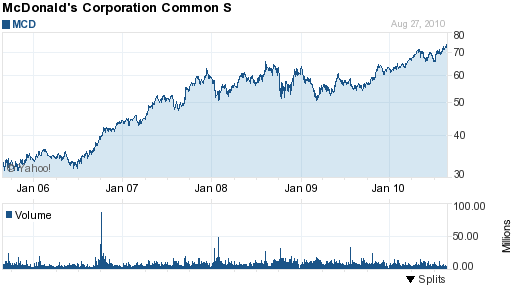August 29, 2010 | In: Opinion
The M&A Gold Rush
Mergers and acquisitions is probably one of the hottest topics these days. After the Intel – McAfee deal, and the 3 PAR circus (see Par-lay?), investors are trying to dissect companies to see which ones are eligible for an acquisition (The stock can easily go up a 50% in case of an acquisition). Let’s first understand why there is this gold rush for M&A and why people and then examine the criteria that investors use to see if a company is a potential takeover.
The latest M&A gold rush started this month, when Intel bought McAfee, paying over 60% premium the stock price. Investors were skeptical at the deal, as the two companies do not really complement each other. Next came the 3 PAR fight, between DELL and HP, both companies trying to aggressively purchase a storage company to complement their servers business. PAR has so far tripled in value. Friday, there was a rumor that Lincoln National Corporation will be bought by Manulife and the stock soared 10% during the day, and another 3% in the after hours. In my opinion, the main reason for the current M&A gold rush is that a lot of companies are currently way undervalued.
Now how do investors analyze companies that may be taken over by larger companies? Personally I look at the following criteria:
– Is the company in a sector that has experienced an M&A recently? (For example, technology)
– Is the company’s main business similar to the business of another company that was taken over? (For example, QTM is similar to PAR, SYMC is similar to MFE.
– Is the company undervalued?
– Is the company making money? (Although I have to say that this point may be irrelevant, PAR has consistently lost money).
– Is the company business model working?
– Are the company’s products in demand?
– Is the company’s stock price below 2 x its book value? If the stock price is below 1 x the book value and the company is making money then it’s a very strong buy, as the potential for M&A is great.
– Are the company’s products bought by a much larger company? This can be a practical starting point to see which companies are potential buys. You examine the suppliers of a large company, say HP, and you see which ones match the previous criteria, with a market capitalization that is no more than 10% of the acquiring company (Although in the case of the LNC rumor, that percentage is much higher).
A few companies that I can think of that may be targeted for an M&A are:
– MLNX (strong buy below $14.80)
– NVDA (strong buy around $9.20)
– QTM (strong buy below $1.30)
